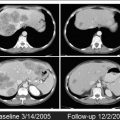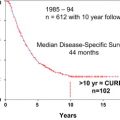The treatment of colorectal cancer has evolved dramatically in recent years with the availability of new chemotherapeutic agents and inhibitors of the vascular endothelial growth factor- and epidermal growth factor-signaling pathways. The incremental benefit of each individual line of therapy for advanced disease is relatively small. Advances in our ability to select patients should improve the cost-effectiveness of our treatment strategies (avoiding unnecessary toxicity in the patients who are unlikely to benefit and accepting the potential for adverse events in the patients who stand to benefit the most from a given regimen).
Key points
- •
The availability of new chemotherapeutic agents (oxaliplatin, irinotecan, capecitabine) as well as vascular endothelial growth factor and epidermal growth factor receptor inhibitors has translated into improved outcomes in colorectal cancer (CRC).
- •
With respect to combination therapy for CRC, more is often better, but at the expense of increased toxicity and cost. It also has the potential to lead to worse outcomes, underscoring the importance of randomized clinical trials and appropriate patient selection.
- •
The addition of oxaliplatin improves outcomes in stage III colon cancer, but the data do not support its use in stage II colon cancer, patients older than 70 years, or as a radiosensitizer in rectal cancer. Furthermore, targeted agents have no role in adjuvant therapy for colon cancer.
- •
Choice of therapy for metastatic disease is governed by several factors, including previous therapy, comorbidities, goals of therapy, tumor mutational status, and personal preference.
- •
The small incremental benefits observed with individual lines of therapy will hopefully be enhanced by better patient selection (ie, avoiding unnecessary toxicity in patients who are unlikely to benefit and accepting toxicity in patients who stand to benefit the most from combination therapy).
Stay updated, free articles. Join our Telegram channel

Full access? Get Clinical Tree





